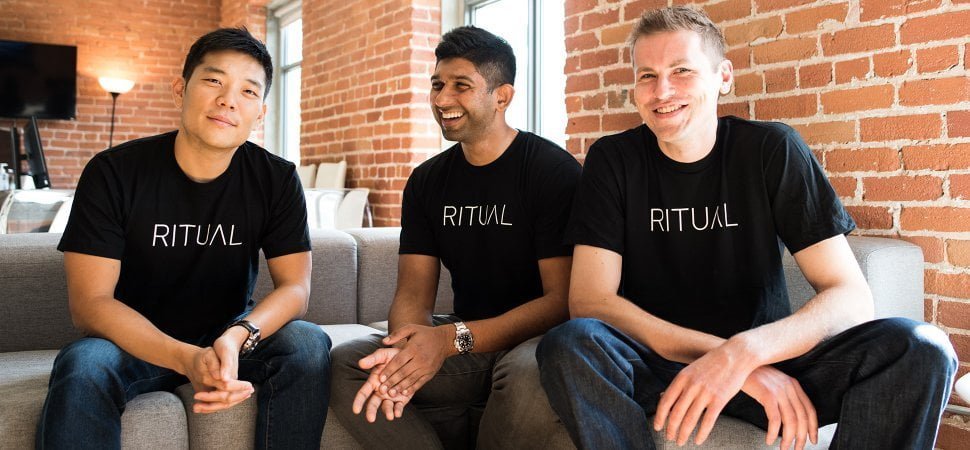
I see you over there. Yeah, you, scarfing that bag of peanuts and candy bar you got out of the vending machine, eating at your desk like 62 percent of Americans do. There’s a better way, OK? Take it from Ray Reddy, co-founder and CEO, and Robert Kim, co-founder and COO, of Ritual.
Making lunch social again
Recently launched nationally in the United States earlier this month, Ritual is a food app that lets you order and pay for goodies from your smartphone. But that’s about where the similarities between this app and other order-and-pay apps end. For starters, the program gives you estimates about when your food is going to be ready. That means you can time your pick-up so the food is always freshest and, if appropriate, hot. That’s handy when you want to make sure you won’t miss a meeting or have the time to send out an important email.
Then there’s the Piggyback feature. Piggyback essentially turns the ordering process into a social affair. Simply confirm which company you work for, and the app will notify you when someone else from your business puts in an order. This way, you can put your order in at roughly the same time, and you can have one person efficiently grab munchies for everybody in one go. If you’re the one doing the pick-up for your group, you’ll earn points you can redeem later for free food.
“Ritual has created a peer-to-peer network driven by people as much as product,” says Reddy. “It is financially and logistically efficient, and [it] creates a powerful network effect where social, viral ordering is enabling free delivery and colleague collaboration. What’s more, by leveraging the power of the peer-to-peer network, Ritual elevates the social network effect at the local level, generating incremental value to local merchants.”
In other words, the goal isn’t just to make it easy to order and pay ahead. It’s really to support the larger small business community by establishing more tech-driven loyalty, and to foster a genuine sense of belonging on teams. Instead of people isolating themselves, grabbing food as an afterthought, meals become a chance to engage and share, to be productive and nurture relationships as much as physical health.
“Food brings people together,” Reddy explains. “With Ritual, we see lunch and coffee breaks as a way to bring co-workers together too by encouraging them to use the app socially and collaborate in new ways. Whether that means taking a walk outside, sitting down to enjoy a bite with coworkers, or squeezing in an extra deadline while your boss has got your back (and you don’t starve!), Ritual gives employees time back in their day. It is a nice way to connect and support your colleagues in the spirit of good health […].”
Benefiting businesses with every order
Because Ritual can support social meals and work, businesses make up a large portion of Ritual’s user base, according to Reddy. Subsequently, the Ritual team has incorporated multiple business-friendly initiatives. For example, employers can choose a lunch budget and schedule, such as $10 three times a week. The employees get credits they can use based on the employers selections. They then can order whatever they like. Any overages go to their credit card, while leftover credits get returned. That makes it easy for companies to eliminate fraudulent claims or eliminate expense reimbursements.
Ritual also has a wellness program that lets employees earn discounts when they make healthy food choices through the app. Empowering workers to eat better in this simple way could make a big difference in absenteeism, productivity and even insurance costs. The app supports after-hours dinners, as well, revealing an understanding that today’s teams increasingly work on global, round-the-clock schedules.
Reddy believes the concepts behind the app could extend far past food–Ritual successfully has tested the program for ferry and Santa-visit tickets, for instance. And Kim claims the company is also looking to improve Piggyback join times, create rich, searchable photo galleries of food items and boost tools that allow merchants to conduct customer, inventory or other analysis.
While Ritual already is well established in Toronto, Canada, for now, the app is partnered with food companies in the United States in just a few major urban areas, including San Francisco, Los Angeles, New York City, Boston, Chicago and Washington, D.C. Scaling isn’t going to be a cakewalk, either. Doing so will require extensive time with each partner to identify how best to support and benefit individual merchants. Ritual also has to resist the temptation to expand too quickly–Kim says that the Ritual team plans to stay neighborhood by neighborhood focused so as to ensure the best selection of restaurants and coffee shops. The founders also want to hire people they’re sure share Ritual’s mission and vision.
But expansion likely will happen, even if it happens intentionally more slowly the way the team plans. One big clue? The company already has raised $57.5 million, with Insight Ventures and Greylock Partners leading the funding. Those investors already see clear benefits: Unlike competitors such as Amazon Prime Now, GrubHub and DoorDash, Ritual
- doesn’t require downloading multiple apps to enjoy many restaurants.
- is social.
- offers rewards.
- doesn’t charge a premium or markup for orders.
- avoids the high, typically unsustainable costs of delivery services.
“We’ve found that consumers love the ability to order ahead and skip the line,” Reddy says, “but still savor those few extra moments to take a coffee break or grab lunch with colleagues.”
Did you catch that?
You’re supposed to savor not just your lunch, but life. Even if Ritual never makes it to your phone, write that one on your calendar in big block letters.

